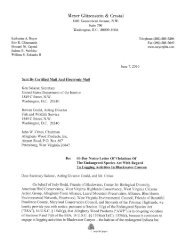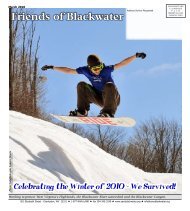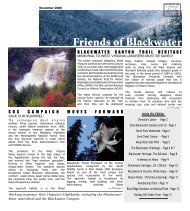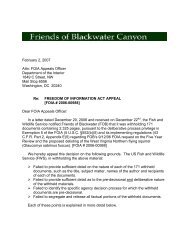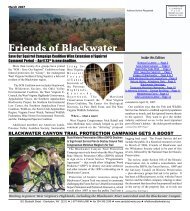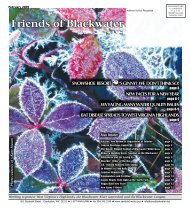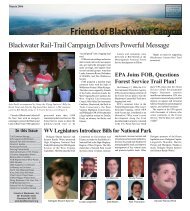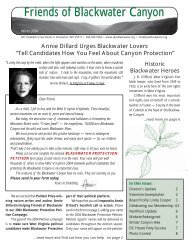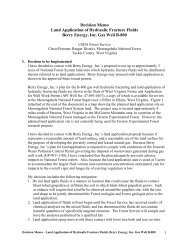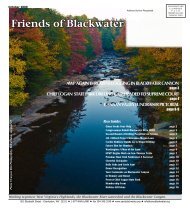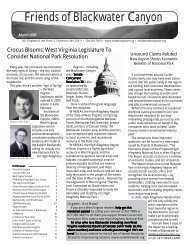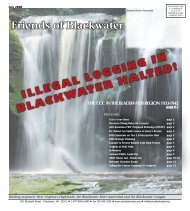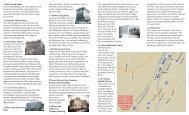Judy Rodd - Friends of Blackwater Canyon
Judy Rodd - Friends of Blackwater Canyon
Judy Rodd - Friends of Blackwater Canyon
Create successful ePaper yourself
Turn your PDF publications into a flip-book with our unique Google optimized e-Paper software.
The Charleston Gazette - print:<br />
March 15, 2007<br />
<strong>Judy</strong> <strong>Rodd</strong><br />
Fish and Wildlife withholding documents: What can be so secret about a<br />
squirrel?<br />
“Ginny,” the West Virginia northern flying squirrel (glaucomys sabrinus fuscus) is a charming, big-eyed, nocturnal<br />
creature that lives only in the high Allegheny Mountains — in seven counties in West Virginia, and one county in<br />
Virginia.<br />
At night, Ginny and her family glide from the trees to the moist forest floor, where they feed on underground fungi. By<br />
day, Ginny nests and raises her young in mature hardwood and spruce forests. Her special home is the beloved<br />
<strong>Blackwater</strong> <strong>Canyon</strong>, West Virginia’s scenic crown jewel.<br />
Ginny is a relic <strong>of</strong> the last Ice Age. When the glaciers retreated, Ginny’s ancestors were isolated on the high mountain<br />
ridges. Like many West Virginians (human and otherwise), Ginny evolved a remarkable lifestyle, surviving in a<br />
demanding and specialized habitat.<br />
Ginny has been on the federal Endangered Species List since 1985. U.S. Fish and Wildlife Service staff say they have<br />
had no funding to establish and implement a proper recovery plan for Ginny and her species under the Endangered<br />
Species Act.<br />
In 2006, top <strong>of</strong>ficials at Fish and Wildlife announced a fast-track “de-listing” proposal for Ginny. Their plan is to strip all<br />
federal endangered species protection from the West Virginia northern flying squirrel.<br />
To add insult to injury, just as the public comment period on their plan was beginning, Fish and Wildlife <strong>of</strong>ficials said<br />
they would “withhold” more than 2,000 pages in their files relating to their “Strip the Squirrel” plan from any public<br />
inspection!<br />
Just what kind <strong>of</strong> hanky-panky is going on at the Fish and Wildlife Service?<br />
Well, it looks like hiding documents about agency plans for Ginny may be part <strong>of</strong> a larger, national problem.<br />
The March 2007 issue <strong>of</strong> Sierra magazine reports evidence suggesting that political appointees in the Department <strong>of</strong><br />
the Interior are subverting the species protection mission <strong>of</strong> the Fish and Wildlife Service.<br />
Here’s how the Beltway’s “culture <strong>of</strong> secrecy” is playing out in West Virginia:<br />
Seven months ago, the “Save Our Squirrel” Coalition asked for the documents that Fish and Wildlife relied on in<br />
preparing its plan. Fish and Wildlife released some documents, but it also filed an <strong>of</strong>ficial response saying that the<br />
public could not see 2,325 pages in the agency’s files.<br />
Fish and Wildlife <strong>of</strong>ficials say these pages are secret, because the documents are “pre-decisional.” That means the<br />
documents show what people in the agency have been doing and thinking since the governmental process started —<br />
out <strong>of</strong> the public view — more than three years ago.<br />
Excuse me? This isn’t national security. What can be so secret about a squirrel?<br />
And what is so wrong with the public knowing what our employees are thinking and doing?<br />
Page 1 <strong>of</strong> 2<br />
Of course, we don’t have to see any secret documents to realize that the “Strip the Squirrel” plan is illegal and absurd.<br />
Fish and Wildlife admits it has no idea how many squirrels there are. The acknowledged threats to Ginny and her<br />
habitat are growing, not shrinking. The documents that have been released suggest that the meager scientific data<br />
have been “cherry-picked” and mischaracterized, to support an unjustified but predetermined conclusion. (Does that<br />
sound familiar?)<br />
The record also shows that the service’s “fast track” protection removal process for Ginny began confidentially, long<br />
before the plan was publicly announced last year. In the past, other species’ suitability for “de-listing” has been publicly<br />
studied and assessed over a number <strong>of</strong> years. (There’s more trouble brewing — we’ve just learned that Fish and<br />
http://www.wvgazette.com/webtools/print/Opinion/Op-Ed+Commentaries/2007031415<br />
3/22/2007
The Charleston Gazette - print:<br />
Wildlife is doing an in-house de-listing review for at least three more high-mountain West Virginia forest species.)<br />
Fish and Wildlife claims we can trust the Monongahela National Forest to protect Ginny, even without endangered<br />
species protection, but the new Mon Forest Plan authorizes a substantial increase in logging in squirrel habitat — what<br />
kind <strong>of</strong> protection is that?<br />
Federal endangered species protection for Ginny is crucial. The teachings <strong>of</strong> the spirit, science, law, common sense,<br />
and pure self-interest are agreed: we must protect this rare, high-mountain “signature species” <strong>of</strong> the West Virginia<br />
Highlands.<br />
Spiritually, we are partners with Ginny in the Creation — and our human species has a special duty <strong>of</strong> stewardship.<br />
Legally, our democratically enacted and well-settled law, the Endangered Species Act, demands continued protection.<br />
Selfishly, the Allegheny Highlands are among West Virginia’s great natural resources and sustainable development<br />
engines. Federal legal protection for Ginny helps preserve the beauty, the clean water, the clean air and the diverse<br />
wildlife <strong>of</strong> the region.<br />
Most important, more than 20 years <strong>of</strong> experience proves that there is plenty <strong>of</strong> room under endangered species<br />
protection to accommodate all reasonable private business and public needs.<br />
The “Save Our Squirrel” Coalition is confident that the illegal, improper, and unwise Fish and Wildlife de-listing plan<br />
must and will founder on the shoals <strong>of</strong> public opposition on every front — scientific, legal, and civic. West Virginians<br />
and our allies will not knuckle under to Beltway machinations.<br />
Meanwhile, Congress should immediately investigate the “Strip the Squirrel” document cover-up — along with all other<br />
improper influence and mismanagement in enforcing and defending the Endangered Species Act.<br />
For information on how you can help Ginny, the West Virginia northern flying squirrel, go to www.saveblackwater.org;<br />
or call (877) WVA-LAND.<br />
<strong>Rodd</strong> is director <strong>of</strong> <strong>Friends</strong> <strong>of</strong> <strong>Blackwater</strong>.<br />
TALK BACK: [WRITE TO THE EDITOR]<br />
Click to Search for Related Stories in our Library<br />
Print this Story<br />
http://www.wvgazette.com/webtools/print/Opinion/Op-Ed+Commentaries/2007031415<br />
Page 2 <strong>of</strong> 2<br />
3/22/2007



